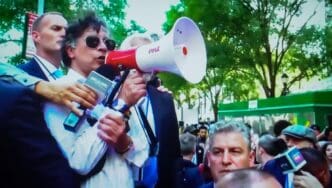Executive Summary
The Story So Far
Why This Matters
Who Thinks What?
The U.S. Treasury Department announced Friday that it has sanctioned Colombian President Gustavo Petro, his wife, son, and Colombia’s interior minister, accusing the president of a “role in the global illicit drug trade.” The move comes amid escalating tensions between President Donald Trump’s administration and Petro, who swiftly rejected the accusations and vowed to fight the sanctions.
Sanctions Rationale and Petro’s Response
Treasury Secretary Scott Bessent stated that the sanctions were imposed because “cocaine production in Colombia has exploded to the highest rate in decades” since President Petro took office, leading to a flood of drugs into the United States. Petro, who has consistently denied such claims, responded on X, stating he had retained an American lawyer to challenge the measures. He called the sanctions a “paradox,” given his decades-long efforts to combat drug trafficking, and affirmed his resolve to not “take one step back, and never on our knees.”
Escalating Bilateral Tensions
These sanctions represent a significant escalation in the ongoing friction between Petro’s government and President Trump’s administration, which has intensified over several months. This period has seen the United States increase military activity in the southern Caribbean, a move sharply criticized by Petro. He has accused the U.S. of being “murderers” for military strikes on alleged drug boats, suggesting some vessels carried innocent Colombians.
Reports indicate that at least one U.S. strike in the Caribbean recently targeted Colombian nationals, and another strike on a submersible left a Colombian survivor. Prior to the sanctions, President Trump had announced the cessation of “all payments” to Colombia, citing Petro’s perceived inaction against drug production. The U.S. State Department also revoked Petro’s visa last month following the UN General Assembly session.
Expert Analysis and Historical Context
Elizabeth Dickinson, senior analyst for Colombia at the International Crisis Group, described the sanctions as “the personalization of a bilateral crisis.” She noted that while a personal conflict exists between the leaders, day-to-day institutional relations between the U.S. and Colombia generally remain strong. Dickinson highlighted that the Colombian military and security forces have been close partners with the United States for nearly four decades, recognizing them as highly capable allies in the region.
Colombia has historically been a crucial ally for Washington in South America on national security and defense matters. In 2022, the Biden administration designated the Andean nation as a “major non-NATO ally,” underscoring its strategic importance.
Responses from Sanctioned Officials
Colombian Interior Minister Armando Benedetti also criticized the sanctions on X, asserting he had “never entered the house of even a single drug trafficker” and dismissing the U.S. action as equating a “non-violent statement” with drug trafficking. He concluded his post with “Gringos go home.”
Nicolas Petro, the President’s son, condemned the move as “political and judicial persecution without precedent” and stated his intention to seek redress from international organizations. The U.S. Treasury Department cited Nicolas Petro’s 2023 arrest in Colombia for money laundering and illicit enrichment, alleging he funneled money from drug traffickers into his father’s “total peace” efforts and election campaign. Nicolas Petro, however, countered that prosecutors had clarified the case did not involve drug trafficking or the presidential campaign.
Outlook on US-Colombia Relations
The imposition of sanctions on a sitting head of state marks a significant and rare diplomatic event, further straining the relationship between the United States and Colombia. While the U.S. maintains that the sanctions are a necessary response to a surge in drug production, President Petro and his allies view them as an unjustified attack on his efforts to combat drug trafficking, signaling a prolonged period of diplomatic tension.








